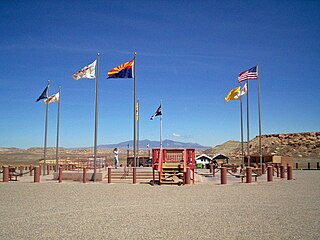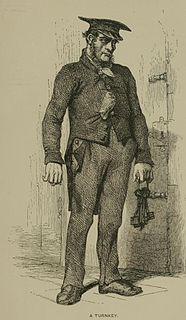Management and Training Corporation
McCotter was subsequently hired as Director of Corrections Business Development for the private sector, Centerville, Utah, based prison and education company Management and Training Corporation (MTC) that manages a number of prisons in the Southwestern United States, Australia, and Canada. In March 2003, he was in charge at the Santa Fe County Detention Center, when a United States Department of Justice team, investigating civil rights violations there, filed a report concluding that conditions violated inmates' constitutional rights, that they suffered "harm or the risk of serious harm" from insufficient healthcare and basic living conditions, citing numerous examples, and threatening a lawsuit if conditions did not improve.

Centerville is a city in southeastern Davis County, Utah, United States. It is part of the Ogden-Clearfield Metropolitan Statistical Area. The population was 15,335 at the 2010 census. It is located adjacent to the easternmost part of the Great Salt Lake.
Management & Training Corporation or MTC is a contractor that manages private prisons and United States Job Corps centers. Based in Centerville, Utah MTC's core businesses are corrections, education & training, MTC medical, and economic & social development. MTC operates 24 correctional facilities in eight states. MTC also operates or partners in operating 22 of the 119 Job Corps centers across the country. They also operate in Great Britain, under the name MTCNovo.

The Southwestern United States, also known as the American Southwest, is the informal name for a region of the western United States. Definitions of the region's boundaries vary a great deal and have never been standardized, though many boundaries have been proposed. For example, one definition includes the stretch from the Mojave Desert in California to Carlsbad, New Mexico, and from the Mexico–United States border to the southern areas of Colorado, Utah, and Nevada. The largest metropolitan areas are centered around Phoenix, Las Vegas, Tucson, Albuquerque, and El Paso. Those five metropolitan areas have an estimated total population of more than 9.6 million as of 2017, with nearly 60 percent of them living in the two Arizona cities—Phoenix and Tucson.
Abu Ghraib
Not long after, on May 20, 2003, Attorney General of the United States John Ashcroft announced that McCotter, along with three other corrections advisers, would be sent to Iraq to assist in assessing criminal justice needs of the Country. His role was to formulate a long term plan for Iraqi prisons. The initial plan the group presented called for construction of four brand new state of the art prison facilities.

John David Ashcroft is an American lawyer and former politician who served as the 79th U.S. Attorney General (2001–2005), in the George W. Bush Administration. He later founded The Ashcroft Group, a Washington D.C. lobbying firm.
In January 2004, McCotter said that his team reviewed the entire Iraqi criminal justice system, supervised reconstruction of the prisons, and trained Iraqi citizens to work in the prisons, including the one at Abu Ghraib, but that prison was empty during their tenure, and they never supervised any military personnel.
The initial plan for building four new prisons in Iraq was not funded by Congress. Because of pressing need, a backup plan was instituted to use existing facilities to house Iraqi criminals. McCotter assisted in refurbishing the physical facilities that would later be used to house inmates, again, including Abu Graib.
McCotter completed his assessments and oversaw refurbishments then returned to the US. Several months after his return to the US the first post invasion prisoner was housed at Abu Graib by military personnel.
In the following months, the national media broke the Abu Graib story, and after intensive investigation McCotter was found to have no role in the management of any prisoners, nor military personnel. There, however, was a much heated debate, including a floor discussion, in the US Senate specifically accusing McCotter of wrongdoing.

Janis Leigh Karpinski is a career officer in the US Army Reserve, now retired. She is notable for having commanded the forces that operated Abu Ghraib and other prisons in Iraq in 2003 and 2004, at the time of the scandal related to torture and prisoner abuse. She commanded three prisons in Iraq, and the forces that ran them. Her education includes a Bachelor of Arts degree in English and secondary education from Kean College, a Master of Arts degree in aviation management from Embry-Riddle Aeronautical University, and a Master of Arts in strategic studies from the U.S. Army War College.

Charles A. Graner Jr. is a former member of the U.S. Army reserve who was convicted of prisoner abuse in connection with the 2003–2004 Abu Ghraib prisoner abuse scandal. Graner, with other soldiers from his unit, the 372nd Military Police Company, were accused of allowing and inflicting sexual, physical, and psychological abuse on Iraqi prisoners of war in Abu Ghraib prison, a notorious prison in Baghdad during the United States' occupation of Iraq.

During the war in Iraq that began in March 2003, personnel of the United States Army and the Central Intelligence Agency committed a series of human rights violations against detainees in the Abu Ghraib prison in Iraq. These violations included physical and sexual abuse, torture, rape, sodomy, and murder. The abuses came to widespread public attention with the publication of photographs of the abuse by CBS News in April 2004. The incidents received widespread condemnation both within the United States and abroad, although the soldiers received support from some conservative media within the United States.
About six months after the United States invasion of Iraq of 2003, rumors of Iraq prison abuse scandals started to emerge.
The Taguba Report, officially titled US Army 15-6 Report of Abuse of Prisoners in Iraq, is a report published in May 2004 containing the findings from an official military inquiry into the Abu Ghraib prisoner abuse. It is named after Major General Antonio Taguba, the report's principal author.
Ghost detainee is a term used in the executive branch of the United States government to designate a person held in a detention center, whose identity has been hidden by keeping them unregistered and therefore anonymous. Such uses arose as the Bush administration initiated the War on Terror following the 9/11 attacks of 2001 in the United States. As documented in the 2004 Taguba Report, it was used in the same manner by United States (US) officials and contractors of the Joint Interrogation and Debriefing Center at the Abu Ghraib prison in Iraq in 2003–2004.

A super-maximum security (supermax) or administrative maximum (ADX) prison is a "control-unit" prison, or a unit within prisons, which represent the most secure levels of custody in the prison systems of certain countries. This is often the most secure form of security within a certain prison system. The objective is to provide long-term, segregated housing for inmates classified as the highest security risks in the prison system—the "worst of the worst" criminals—and those who pose an extremely serious threat to both national and global security.

Prison officer is one term for a uniformed official, responsible for the supervision, safety, and security of prisoners in a prison, jail, or similar form of secure custody. They are responsible for the care, custody, and control of individuals who have been arrested and are awaiting trial while on remand or who have been convicted of a crime and sentenced to serve time in a prison or jail. They are also responsible for the safety and security of the facility itself. Most officers are employed by the government of the jurisdiction in which they operate, though some are employed by private companies.

The Fay Report, officially titled Investigation of Intelligence Activities at Abu Ghraib, was a military investigation into the torture and abuse of prisoners at the Abu Ghraib prison in Iraq. It was sparked by leaked images of Iraqi prisoners, hooded and naked, being mistreated obtained by the United States and global media in April 2004. The Fay Report was one of five such investigations ordered by the military and was the third to be submitted, as it was completed and released on August 25, 2004. Prior to the report's release, seven reservist military police had already been charged for their roles in the abuse at the prison, and so the report examined the role of military intelligence, specifically the 205th Military Intelligence Brigade that was responsible for the interrogation of prisoners at Abu Ghraib. General Paul J. Kern was the appointing authority for the report and oversaw the investigation. The chief investigators were Major General George Fay, whom the report is named after, and Lieutenant General Anthony R. Jones.

Naval Consolidated Brig, Miramar (NAVCONBRIG) is a military prison operated by the U.S. Navy at Marine Corps Air Station Miramar in Miramar, San Diego, California, just under 10 miles (16 km) north of downtown San Diego. It is one of three Navy consolidated brigs and is the Pacific area regional confinement facility for the United States Department of Defense. It is also known as the Joint Regional Correctional Facility Southwest. The 208,000-square-foot (19,300 m2) facility has a capacity of up to 400 male and/or female prisoners and is staffed with 31 civilian and 173 military personnel.

The Prisoner or: How I Planned to Kill Tony Blair is a 2006 documentary film by American documentary filmmaker Michael Tucker.
Ruiz v. Estelle, 503 F. Supp. 1265, filed in United States District Court for the Southern District of Texas, eventually became the most far-reaching lawsuit on the conditions of prison incarceration in American history.

W. J. "Jim" Estelle Unit is a prison located on Farm to Market Road 3478 in unincorporated Walker County, Texas, United States, 10 miles (16 km) north of central Huntsville. The prison, with about 5,459 acres (2,209 ha) of space, is operated by the Texas Department of Criminal Justice. The unit, which opened in June 1984, was named after Ward James "Jim" Estelle, a former prison director of Texas.
A number of incidents stemming from the September 11 attacks have raised questions about legality.
The United States Virgin Islands Department of Justice is a department of the United States Virgin Islands government.

George John Beto, Ph.D. was a former director of the Texas Department of Corrections, a criminal justice expert in penology, a professor, and a Lutheran minister. He was previously President of Concordia Lutheran College in Austin and Concordia Theological Seminary in Illinois.

Alfred D. Hughes Unit is a prison for men of the Texas Department of Criminal Justice located in Gatesville, Texas. The prison is named after Al Hughes who served as a chairperson on the Texas Board of Corrections from 1985 to 1989.


















